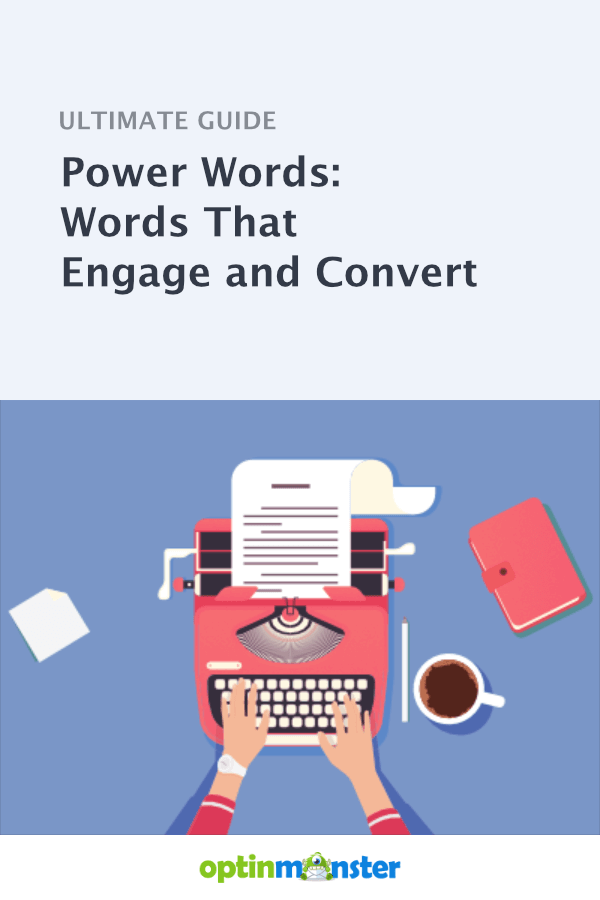Blog writing strategies harness the power of words to engage readers and drive traffic. Crafting compelling content boosts SEO visibility and connects with a broader audience.
Catching the reader's attention, convincing them of your expertise, and inspiring action are vital components of successful blog writing. In today's digital world, using the right words strategically can make all the difference in reaching your target market. Implementing effective blog writing strategies helps enhance your online presence and reinforces your brand authority.
By understanding the nuances of language and the psychology behind effective communication, you can optimize your blog content for maximum impact. Let's explore the art of harnessing the power of words in blog writing to elevate your online reach and engagement.

Credit: optinmonster.com
The Impact Of Power Words
Discover the profound impact of power words on blog writing strategies. Learn how using compelling language can greatly enhance your content, engaging and inspiring your audience. By incorporating persuasive language, writers can effectively convey their message and evoke strong emotions, leading to increased reader engagement and retention.
| The use of power words in blog writing can greatly influence readers. |
| These emotional triggers create engagement and resonate with the audience. |
| By incorporating powerful language, writers can evoke strong emotions in readers. |
| Engaging content leads to increased interest and higher reader retention. |
| Effective use of emotional words enhances connection with the target audience. |
Choosing The Right Power Words
When selecting power words, always consider your audience's preferences. Understand what resonates with them and tailor your language accordingly. Highlight the key benefits of your content using compelling terminology to captivate readers. By leveraging the impact of power words, you can engage your audience and convey your message effectively.
Implementing Power Words In Blog Writing
Implementing Power Words in Blog Writing: When creating compelling blog content, leveraging persuasive language can have a significant impact on audience engagement. By incorporating power words into headlines and titles, writers can captivate readers from the outset and encourage them to delve deeper into the content. Effective implementation of these words can evoke emotion and curiosity, driving increased traffic and interaction.
Furthermore, utilizing persuasive language throughout the post in the form of call-to-action phrases can prompt readers to take desired actions, such as sharing the post or subscribing to a newsletter. By employing a strategic approach to incorporating power words, writers can elevate the impact of their blog content and effectively connect with their target audience.
Avoiding Overuse Of Power Words
The key to effective blog writing is finding the right balance between using power words and maintaining authenticity. While power words can be impactful, overusing them can make your content appear forced and insincere. By avoiding excessive reliance on power words, you can ensure that your writing remains genuine and relatable, resonating with your readers on a deeper level.
Authenticity is crucial in blog writing. It is important to stay true to your own voice and style, and not get carried away with using excessive power words just for the sake of it. Focus on conveying your message clearly and connecting with your audience through meaningful and authentic content.
Another aspect to consider is subtlety. While power words can add emphasis and draw attention, using them too frequently can be overwhelming for readers. Strike a balance by incorporating power words strategically and judiciously, allowing them to enhance your message without overpowering it. This way, you can create engaging and impactful content that resonates with your readers while maintaining authenticity.
Measuring The Effectiveness
The Power of Words: Blog Writing StrategiesTracking Engagement Metrics: It's crucial to track engagement metrics to gauge the effectiveness of your blog writing strategies. Use a reliable analytics tool to gather data on metrics such as page views, average time on page, bounce rate, and social shares. These metrics provide insights into how your audience is interacting with your content. By monitoring these statistics, you can identify which blog posts are resonating with your readers and which ones need improvement.
A/B Testing: Another effective way to measure the impact of your blog writing strategies is through A/B testing. This involves creating two versions of the same blog post with slight variations in the content, layout, or call-to-action. By comparing the performance of these versions, you can determine which approach leads to higher engagement, click-through rates, and conversions. Continuously experimenting with A/B testing allows you to refine your writing strategies and optimize your blog for better results.

Credit: rankmath.com

Credit: m.facebook.com
Frequently Asked Questions On The Power Of Words: Blog Writing Strategies
Faq 1: How Can Blog Writing Strategies Improve Search Engine Rankings?
Effective blog writing strategies can improve search engine rankings by utilizing SEO techniques such as keyword optimization, creating quality content, incorporating internal and external links, and using proper formatting. These strategies increase website visibility, boost organic traffic, and ultimately improve search engine rankings.
Faq 2: Are There Any Specific Words Or Phrases That Should Be Included In Blog Posts?
Including relevant keywords and phrases in blog posts help search engines understand the content and rank it accordingly. Conducting keyword research and using tools like Google Keyword Planner can identify high-performing keywords to include naturally throughout the blog. However, it is essential to avoid keyword stuffing and prioritize delivering valuable information to readers.
Faq 3: Should Blog Posts Have A Specific Structure Or Format?
Blog posts benefit from a clear structure and formatting that improves readability and user experience. Using subheadings, bullet points, and short paragraphs breaks down the content into digestible sections. Additionally, including an introduction, body, and conclusion helps readers navigate the blog post and understand the main ideas being discussed.
Conclusion
To sum up, the art of blog writing holds great influence in the digital realm. By incorporating effective strategies and mindful language, writers can capture the attention of their audience and drive meaningful engagement. Understanding the power of words and implementing SEO-friendly techniques can truly elevate the impact of any blog post.
Embracing these principles is key to creating compelling and impactful content.
